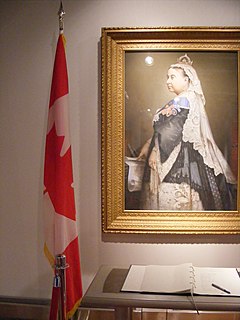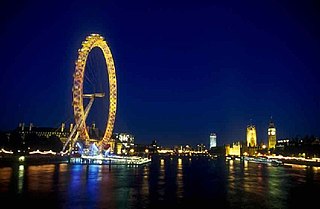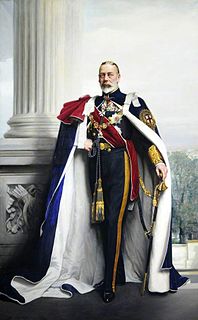
Victoria Day is a federal Canadian public holiday celebrated on the last Monday preceding May 25. Initially in honour of Queen Victoria's birthday, it has since been celebrated as the official birthday of Canada's sovereign. It is informally considered to be the beginning of the summer season in Canada.

The King's Official Birthday is the selected day in the United Kingdom and most Commonwealth realms on which the birthday of the monarch is officially celebrated in those countries. It does not necessarily correspond to the date of the monarch's actual birth.

The Silver Jubilee of Elizabeth II marked as 25 years of reign of Queen Elizabeth II on 6 February 1952. It was celebrated with large-scale parties and parades throughout the United Kingdom and the Commonwealth throughout 1977, culminating in June with the official "Jubilee Days", held to coincide with the Queen's Official Birthday. The anniversary date itself was commemorated in church services across the land on 6 February 1977, and continued to be for the rest of that month. In March, preparations started for large parties in every major city of the United Kingdom, as well as for smaller ones for countless individual streets throughout the country.

The Golden Jubilee of Elizabeth II was the international celebration held in 2002 marking the 50th anniversary of the accession of Queen Elizabeth II on 6 February 1952. It was intended by the Queen to be both a commemoration of her 50 years as monarch and an opportunity for her to officially and personally thank her people for their loyalty.
The Birthday Honours, in some Commonwealth realms, mark the reigning British monarch's official birthday by granting various individuals appointment into national or dynastic orders or the award of decorations and medals. The honours are presented by the monarch or a viceregal representative. The Birthday Honours are one of two annual honours lists, along with the New Year Honours. All royal honours are published in the relevant gazette.

The monarchy of Solomon Islands is a system of government in which a constitutional monarch is the head of state of Solomon Islands. The present monarch is King Charles III, who is also the head of state of fourteen other Commonwealth realms. Although the person of the sovereign is equally shared with 14 other independent countries within the Commonwealth of Nations, each country's monarchy is separate and legally distinct. As a result, the current monarch is officially titled the King of Solomon Islands and, in this capacity, he and other members of the royal family undertake public and private functions domestically and abroad as representatives of Solomon Islands. However, the King is the only member of the royal family with any constitutional role.

The monarchy of Australia is Australia's form of government embodied by the Australian sovereign and head of state. The Australian monarchy is a constitutional monarchy, modelled on the Westminster system of parliamentary government, while incorporating features unique to the Constitution of Australia.

The Grand Duke's Official Birthday, also known as Luxembourgish National Day, is celebrated as the annual national holiday of Luxembourg. It is celebrated on 23 June, although this has never been the actual birthday of any ruler of Luxembourg. When the monarch of Luxembourg is female, it is known as the Grand Duchess's Official Birthday.
An accession day is usually the anniversary of the date on which a monarch or executive takes office. The earliest records of accession celebrations date from the reign of Emperor Kanmu of Japan, and the custom is now observed in many nations.

The monarchy of Belize is a system of government in which a hereditary monarch is the sovereign and head of state of Belize. The current Belizean monarch and head of state is King Charles III. As sovereign, he is the personal embodiment of the Belizean Crown. Although the person of the sovereign is shared with 14 other independent countries within the Commonwealth of Nations, each country's monarchy is separate and legally distinct. As a result, the current monarch is officially titled Kingof Belize and, in this capacity, he and other members of the royal family undertake public and private functions as representatives of the Belizean state. However, the King is the only member of the royal family with any constitutional role.

The monarchy of Papua New Guinea is a system of government in which a hereditary monarch is the sovereign and head of state of Papua New Guinea. The current monarch, since 9 September 2022, is King Charles III. Although the person of the sovereign is equally shared with 14 other independent countries within the Commonwealth of Nations, each country's monarchy is separate and legally distinct. As a result, the current monarch is officially titled the King of Papua New Guinea and, in this capacity, he and other members of the Royal Family undertake public and private functions domestically and abroad as representatives of the Papua New Guinean state. However, the King is the only member of the Royal Family with any constitutional role. The King lives predominantly in the United Kingdom and, while several powers are the sovereign's alone, most of the royal governmental and ceremonial duties in Papua New Guinea are carried out by the King's representative, the governor-general.

The monarchy of Tuvalu is a system of government in which a hereditary monarch is the sovereign and head of state of Tuvalu. The present monarch of Tuvalu is King Charles III, acceding on 9 September 2022, who is also the Sovereign of 14 other Commonwealth realms. The King's constitutional roles are mostly delegated to the Governor-General of Tuvalu.

A birthday is the anniversary of the birth of a person, or figuratively of an institution. Birthdays of people are celebrated in numerous cultures, often with birthday gifts, birthday cards, a birthday party, or a rite of passage.

Koningsdag or King's Day is a national holiday in the Kingdom of the Netherlands. Celebrated on 27 April, the date marks the birth of King Willem-Alexander. When the Dutch monarch is female, the holiday is known as Koninginnedag or Queen's Day and, under Queen Beatrix until 2013, was celebrated on 30 April.

Elizabeth II was Queen of Ghana from 1957 to 1960, when Ghana was an independent sovereign state and a constitutional monarchy. She was also queen of the United Kingdom and other sovereign states. Her constitutional roles in Ghana were delegated to the governor-general of Ghana.

Elizabeth II was Queen of Tanganyika from 1961 to 1962, when Tanganyika was an independent sovereign state and a constitutional monarchy. She was also the monarch of other sovereign states, including the United Kingdom. Her constitutional roles in Tanganyika were mostly delegated to the governor-general of Tanganyika.
Crown Honours Lists are lists of honours conferred upon citizens of the Commonwealth realms. The awards are presented by or in the name of the reigning monarch, currently King Charles III, or his vice-regal representative.

The Sapphire Jubilee of Elizabeth II on 6 February 2017, marked 65 years of Queen Elizabeth II's reign. The longest-reigning monarch in British history, Elizabeth II was the first British monarch to have a sapphire jubilee.

The Platinum Jubilee of Elizabeth II was the international celebration in 2022 marking the 70th anniversary of the accession of Queen Elizabeth II on 6 February 1952.

The Silver Jubilee of George V on 6 May 1935 marked 25 years of George V as the King of the United Kingdom and the British Dominions, and Emperor of India. The Jubilee was marked with large-scale and popular events throughout London and the rest of the United Kingdom in May 1935. It was the first ever Silver Jubilee celebration of any British monarch in history. The King died less than a year later.
















